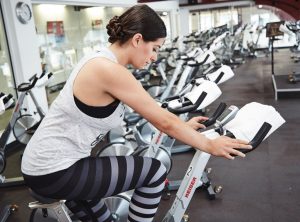
Probably upwards of 99% of people are experts at making excuses for not doing what they know they should – if not to others, then to themselves. Perhaps the best example of this is people not exercising because they “don’t have the opportunity.” As it happens, the busiest people regularly make time in their schedule for exercise and don’t skip a workout if there is any way to avoid it, and here’s why:
Combining exercise and talk therapy is certainly a good idea, as it may amplify the benefits of both. Presumably both therapist and client are better off engaging in physical activity; we all sit more than we should. — Judith J. Wurtman Ph.D.
Carefree Productivity

It’s a well-known fact that excessive stress is the enemy of productivity. This may lead to falling behind at work and having to work more hours, further increasing a person’s stress levels. Someone who feels overwhelmed instead of challenged will tend to have difficulty concentrating and multitasking, fail to distinguish between the important and the trivial and be less able to interact effectively with colleagues.
Regular exercise, whether a ten-minute walk at lunchtime or something more intensive, is one of the best counters to chronic stress. It will also help restore the hormone levels that stress disrupts, improving their immune system. Nobody can perform at their peak when they’re stuck with the flu.
Every year, losing weight beats quitting smoking, volunteering, and spending more time with family as the most popular New Year’s resolution. It’s also the one most commonly broken, according to Time. — Tina Gilbertson, MA, LPC
Going To The Gym Regularly Beats The Procrastination Habit
One of the things bodybuilders regularly point to as one of the advantages of their hobby is not the health benefits nor their appearance: it is the self-discipline and willingness to push themselves that they learned at the gym. Even if you don’t care to go the whole route of protein shakes and kidney belts, making a decision to hit the gym three times a week (and actually sticking to it) is a good way to build up confidence in your ability to do what’s necessary or beneficial. This quickly translates into no longer putting off unpleasant projects at work or home, making your time management more efficient and leaving you with more time to simply relax.

Exercise Directly Improves The Mind
The brain contains around 100,000 miles of blood vessels. Laid end to end, they would stretch four times around the earth. All of that plumbing needs a strong cardiovascular system to function effectively, and if a person’s heart isn’t in good shape, the likely results include increased fatigue, memory problems, and headaches.
Building up the heart muscle and stretching the arteries is not the only way exercise boosts brain function and mental health. Our happiness and cognitive ability are dependent on chemicals called neurotransmitters being in balance, and exercise helps to restore them to normal levels. In this regard, exercise is almost as efficient as chemical treatment for diseases such as chronic anxiety and depression. Exercise is even a key factor for encouraging the growth of fresh brain cells (neurogenesis) and slows down the shrinking of the brain as people get older.
Taking deep, rhythmic breaths is one of the most powerful ways to put the brakes on the sympathetic nervous system and stimulate a relaxation response. — Michelle Kukla, PsyD
Boosts Creativity
While people like to divide work into creative and non-creative types, the truth is that finding an accounting error often requires a little lateral thinking, just like making good decisions involves being able to visualize their outcomes. As it happens, the ability of people to come up with creative solutions has been shown to improve for up to two hours after exercising. While your boss may frown on employees doing pushups next to their desks, running up and down the stairwell for a few minutes may be just what is needed to solve an intractable problem.
Exercise Improves Sleep

Everybody must have experienced this more or less often: going to bed at your usual time, followed by repeated gyrations in order to get comfortable. After an hour of just not being able to sleep, you start stressing about not getting enough rest, which drives dreamland even farther away.
Our bodies and nervous systems are really built to be dependent on a reasonable amount of exercise, so that stress, medication and other factors playing tricks on our hormones and neurotransmitters can leave us unable to drift off even while feeling tired. Exercise is one of the most effective remedies for insomnia.
***
Working out can leave you tired for an hour and sore for a day, but this is the wrong aspect to focus on. If you want to be more productive, happier and more energized, regular exercise is the one single thing you can do to achieve all of this.